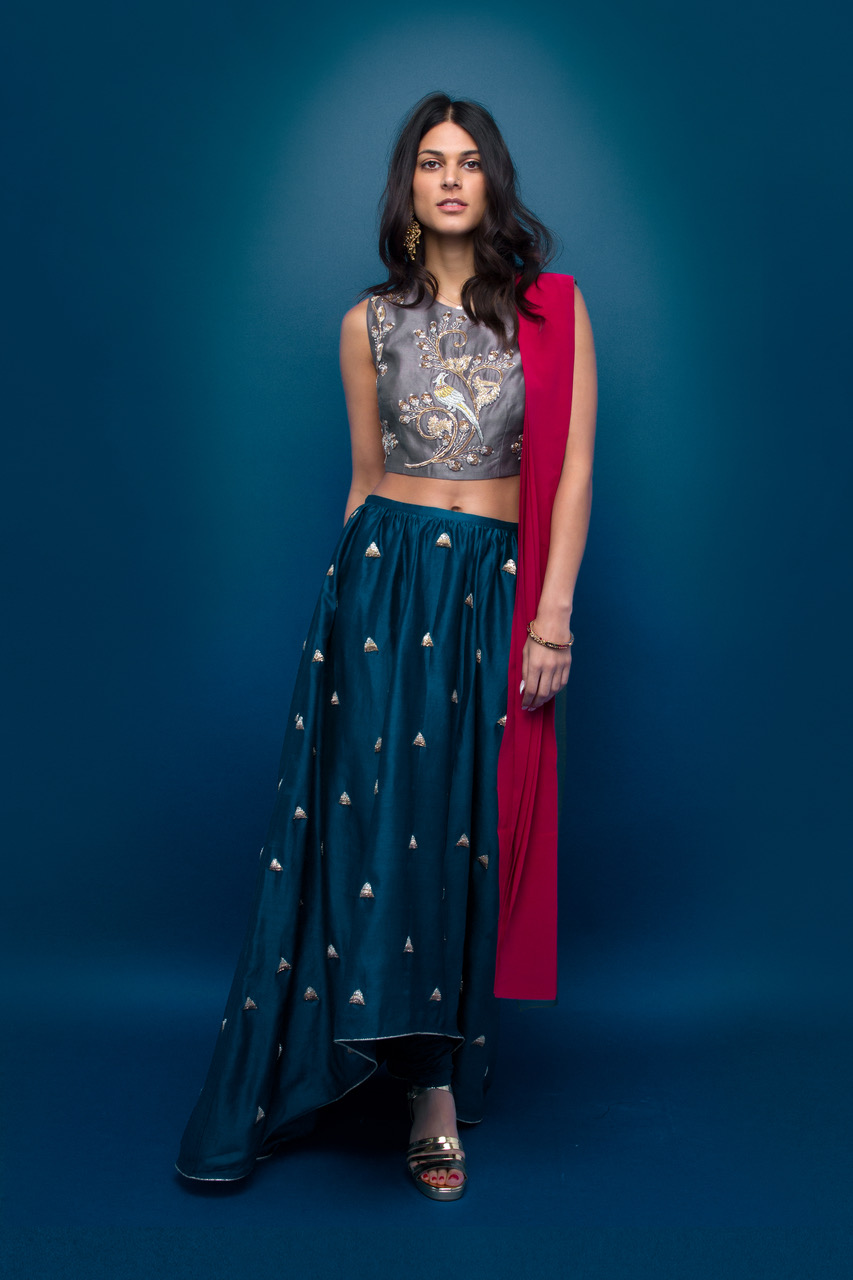East meets West: Rani by Raja
By BEL JACOBS
India’s economic growth has been lightening fast. Earlier this month, figures confirmed that the country will be the world’s fastest growing economy in 2018.
But while this has meant hope and prosperity for millions, India’s growth is raising big questions about sustainability: about waste and pollution, about culture and heritage.
Nowhere is this more evident than in fashion, ever a societal and economic barometer. Increased income means increased demand – but is this good when the world is already heaving with excess? And where does the culture of fast fashion leave India’s artisan handicrafts, the country’s second biggest employer?
Gandhi used khadi – traditional hand-spun – to shape the nation’s identity in the face of colonial rule. Now, a new generation is using fashion to re-envision India’s place in the global economy.
Some, such as the The Handloom School, focus on revivifying local crafts. The waste that flows through India’s rivers and streets is the focal point of brands such as Urmi Weave, which makes bags from household plastic.
‘Do U speak Green’ uses only organic cotton and bamboo-based fabrics. The philosophy of No Nasties is “equal parts of Organic, Fair Trade and Awesome.” Buy an organic t-shirt from Samtana and you contribute to mid-day meals for school children, helping tackle both malnutrition and illiteracy.
Yet another label is hoping to offer Indian women, the lion’s share of both its new consumer class and its artisanal workforce, a chance to explore new roles. Rani by Raja was founded in the UK in 2017 by Nimi and Akta Raja, sisters from a family with 40 years in Indian fashion. But the girls wanted to do something different.
Straddling cultures, the sisters grew up in a world of contrast and contradiction: listening to Michael Jackson, watching Kishore Kumar, drinking chai, eating chips. Traditional Indian clothes felt stiff and uncomfortable, with outdated notions of femininity.
Before long, the sisters were making their own clothes, breaking rules and barriers without destroying roots. “Rani (which means ‘Hindu queen’) by Raja was born out of a desire to redefine the boundaries between the East and West,” muses Akta. “We’re the personification of that redefinition. Having seen things from both sides, we’re uniquely placed to challenge stereotypes, assumptions or unconscious bias.”
The result are are ethically created clothes for modern women that cross cultural divides. Clean lines and vibrant colour are paired with modest silhouettes and rich traditional crafts to make pretty cropped blouses or cholis, lehengar skirts and ankle length palazzo pants in dazzling embroidered silks.
“We take the best of both cultures and form an incredibly rich identity,” says Akta. “For us, these aren’t ‘Indian clothes’. They’re inspired and created by the unique artisanal skill in India, but they’re for anyone.”
The site also offers work by progressive Indian designers, Payal Singhal, Poonam Bhagat and Toronto-based Mani Jaasal, who share the cousins’ philosophy of ethical practice. “They support their supply chain, treat workers fairly, use locally sourced materials and non-chemical dyes and raise awareness of and support causes out of their own profits,” says Akta, simply.
Meanwhile, India is in the throes of a rapid evolution: “India needs to recognise the power in its own resources: from its ability to harness less carbon intensive sources of power to its talented and vast workforce,” says Akta.
It also needs to recognise one of its most valuable assets in the journey towards greater sustainability: women. “We’d like to see women recognising the power they have, realising that they have choices and a voice. And we’d like to see men recognising those voices.”
In a final note, Akta addresses India’s horrific rape crisis, with currently 106 rapes per day, 4 in 10 of the victims very young, which sees women treated as objects of use, no more.
“These are not women’s issues, they’re people-wide – and that includes us in the West,” she says, emphatically. “And it requires more fundamental changes in attitude, more systemic changes, to make sure women are safe.”
By supporting women’s work, channelled through the right sources, labels like Rani by Raja can only raise the status of all women in India and beyond.



